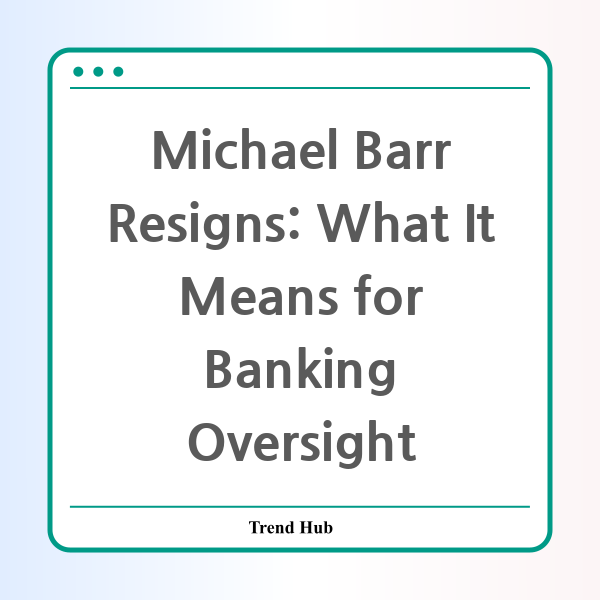* This website participates in the Amazon Affiliate Program and earns from qualifying purchases.

In a significant move that could reshape the landscape of banking regulation in the United States, Michael Barr, the Federal Reserve's top banking regulator, announced his resignation from the position of vice chair for supervision, effective February 28. While he will remain on the Fed's board of governors, his decision to step down is seen as a strategic maneuver to avoid a potential confrontation with President-elect Donald Trump, who has indicated an interest in appointing a banking-friendly successor.
Barr's announcement comes amid a backdrop of speculation that Trump may seek to replace him following his inauguration on January 20. By voluntarily resigning from his supervisory role, Barr aims to prevent any legal disputes regarding his position and to ensure that the Federal Reserve can continue its critical oversight of the financial system without interruption.
Why Did Barr Step Down?
In his official statement, Barr noted, "The risk of a dispute over the position could be a distraction from our mission." His decision reflects a desire to prioritize the stability and strength of the U.S. financial system over potential political conflicts. By transitioning to a non-supervisory role, Barr enables the Federal Reserve to focus on its essential tasks, particularly as it navigates the complexities of post-pandemic banking regulations.
During Barr’s tenure as vice chair for supervision, the U.S. banking sector experienced significant challenges, including the collapse of Silicon Valley Bank in early 2023. This incident, among others, led to the Fed implementing new liquidity measures to stabilize the financial markets. As such, Barr's role has been particularly pivotal, especially in the wake of the 2008 financial crisis that highlighted the need for robust banking oversight.
Implications of Barr’s Resignation
Michael Barr's resignation opens the door for President Trump to appoint a successor who aligns more closely with his administration's banking policies. This potential shift could lead to a more lenient regulatory environment, impacting everything from bank capital requirements to risk management practices. In recent years, there has been growing concern among industry leaders regarding the existing set of regulations, known informally as the Basel endgame, which have been viewed as cumbersome and restrictive.
The Federal Reserve has indicated that it will refrain from making any major decisions on rules and regulations until a new vice chair for supervision is named. This pause in rulemaking could allow the incoming administration to reshape the regulatory framework according to its financial philosophies.
The Future of Banking Supervision
As the financial community awaits Trump's choice for Barr's successor, the broader implications of this transition become apparent. The new vice chair for supervision will have a crucial role in steering U.S. banking policy during a time of economic recovery and uncertainty. Stakeholders, including banks and consumers, will be keenly watching how the incoming administration approaches regulatory reform and oversight.
Michael Barr's legacy as the Federal Reserve's banking supervisor will be remembered for its challenges and the tumultuous nature of the banking environment during his tenure. However, by stepping aside, he has taken a proactive step to ensure that the Federal Reserve remains focused on its mission without political distractions.
Conclusion
In summary, Michael Barr’s resignation from the Fed's vice chair role is a pivotal moment for U.S. banking regulation. His decision underscores the importance of stable leadership in the financial system and sets the stage for potential changes in banking oversight. As we move forward, the choice of Barr's successor will undoubtedly play a critical role in shaping the future of financial regulation in America.
* This website participates in the Amazon Affiliate Program and earns from qualifying purchases.